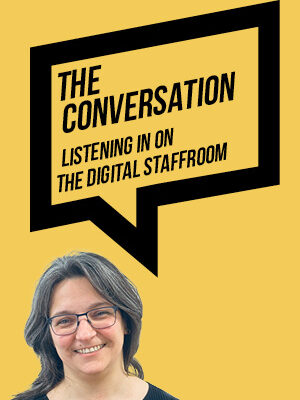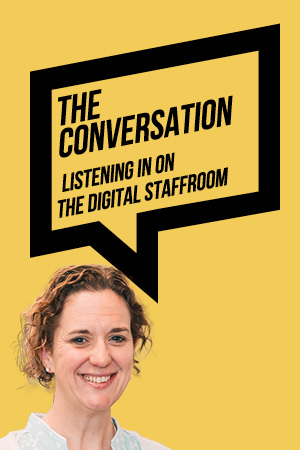Jess Mahdavi-Gladwell
Teaching is a beautiful rebellion

I was instantly drawn to the title of this blog. Written for new teachers at the end of their training and describing itself as a manifesto, it contains a call to us all.
As we approach the final days of the school year, I wish for us all some deep rest. Rest which will prepare us for the new school year. Rest which will leave us refuelled to create classrooms where joy waits at the door to greet our children.
But as well as the anticipation of an ending, headteacher Jeremy Hannay points out that this time of year also brings anticipation of new beginnings – the start of a new autumn term which he describes as ‘wild, wonderful, painful, hilarious, messy, magical.’
As we prepare to say goodbye to children, colleagues, classrooms, let us rest in preparation, so that we can bring our whole selves to the new opportunities ahead.
Have a great summer, beautiful rebels.
Sarah Gallagher
Are smartphones ruining childhood?

This podcast has consistently informed the many, many conversations I’ve had this year about childhood and adolescence today.
Last week, I misplaced my phone during our summer performance. Unable to doom-scroll that evening, I wondered whether I should go back to an analogue phone.
I know the theory, but I haven’t quite been brave enough to put it into practice yet. And I’m a grown-up who did experience a phone-free childhood.
For me, it’s not just about the mobile phone issue though; it’s the insidious eradication of childhood in many more areas. This is what Jonathan Haidt argues so compellingly.
How do we build resilience in our children and let them explore and got outdoors into the big wide world like we used to while ensuring their safety in what feels like a more dangerous world?
As the podcast discusses, it’s about being present and enabling children to be present in their childhood. Perhaps the summer will give us some fresh air and playtime to do just that – for our good and theirs.
Zara Simpson
What makes a great secondary school library

I’ve always appreciated the role of libraries in schools, but even so this podcast has completely reframed my thinking about their potential – as hubs of inclusion and wellbeing as well as literacy.
Listening to school librarians and English leads describe how carefully-designed spaces with soft furnishings, flexible layouts and quiet corners can become sanctuaries for neurodiverse pupils was genuinely eye-opening.
Since then, I’ve looked at our own library with fresh eyes. We already incorporate some of these ideas, but the podcast made me realise just how vital it is to protect these spaces in the face of shrinking budgets and ever-expanding digital demands.
It also prompted me to explore ways to use the library more creatively across the curriculum and to think harder about how pupil-led initiatives, author visits and cross-curricular projects can boost engagement.
I would recommend a listen to anyone involved in school leadership, pastoral care or curriculum planning. It’s a brilliant reminder that a great library isn’t a luxury, it’s an engine of school culture.
Louise Lee
Inclusive pedagogy: Best practices

If you’re like me you’re already thinking about next year’s ‘shocks’ to our system, not least SEND reform. Amjad Ali has revived his blog NewToThePost to bring an update on inclusive pedagogy – a timely reminder of how much we know about strategies to include.
The focus is simple: teach our children as well as you can – all of them.
In this spirit, Ali contrasts more traditional ‘differentiation’ (involving pre-lesson preparation) with ‘adaptive teaching’ (responses in the moment to maximise learning).
With 40 per cent of children recognised with SEND at some point, he advocates for responsive teaching to support ‘anybody that needs help, support, extra, a push and a probe’.
Ali quotes the Code of Practice on the value of ‘high-quality teaching’, but he also reminds us that ‘poor teaching affects underserved students disproportionately’.
As more is being rightly asked of teachers in building more inclusive classrooms, this is a fitting reminder that we know all we need to meet these challenges. And for those children who need us the most, we simply must.
Frances Akinde
Why AI can’t handle autistic communication

My blog of the year was only published a couple of weeks ago, but it’s a powerful, necessary critique of how AI systems often fail to understand neurodivergent ways of communicating and it’s one I know I will keep referring to.
As someone who champions inclusion and equity in education, I found Caroline Keep’s words both validating and challenging. A leading voice in education, neurodiversity and technology, Keep writes about the people often left out of the systems that are meant to be designed with them in mind.
This piece made me pause and reflect on how we define communication in schools. Too often, neurodivergent (in particular, autistic) voices are misunderstood or dismissed. The way this article exposes how AI risks replicating those same biases at scale truly made me pause and reflect.
This is not just about AI; it’s about the future of communication, which in turn has a profound effect on how we teach. Essential reading for educators, technologists, and policymakers alike.
Fiona Atherton
Thinking fast and slow on school improvement

Leading a new school with a new team, I’ve spent a lot of time this year trying to strike the right balance between urgency and purpose (and definitely not always succeeded!).
I’ve often felt the need to prove myself by being seen to act quickly and decisively, and this blog has reminded me that deep, strategic thinking requires space and permission to slow down.
Howard’s idea of noise (ie. all the pressures that surround us as school leaders) really resonated with me when I first read it, and it still does now in the season on school development plans, reports to governors and the like.
Whenever I’ve needed to ‘reduce the noise’, I’ve turned to Howard’s blog – and her discussion of cognitive bias is also well worth engaging with.
As I read the blog one more time for this column, my reflection is that strategic change and improvement need deliberate though, and sometimes the bravest thing we can do as leaders is pause.











Your thoughts